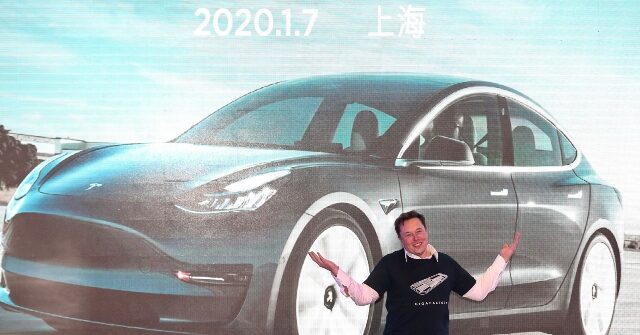Elon Musk’s Tesla will exclude China-made components from its cars manufactured in the United States. The move is designed to address escalating trade tensions and geopolitical risks
The Wall Street Journal reports that Elon Musk’s Tesla is taking decisive steps to reduce its reliance on Chinese suppliers for its U.S.-made vehicles. The company has mandated that its suppliers exclude China-made components in the manufacturing of Tesla cars in the United States, according to people familiar with the situation. This move comes as a response to the deepening geopolitical tensions between the U.S. and China.
The electric car maker has already started replacing some China-made components with parts manufactured elsewhere, in collaboration with its suppliers. Tesla aims to completely transition to non-Chinese components for its U.S. production within the next one to two years. This accelerated strategy was triggered by President Trump’s imposition of steep tariffs on Chinese imports, making it imperative for the company to minimize its exposure to the uncertainties of the U.S.-China trade war.
China has been a major producer and exporter of auto parts, including chips, batteries, and materials used in car manufacturing. The country’s massive production scale, lower costs, and weak currency have made Chinese components more affordable for automakers. However, the fluctuating tariff levels resulting from the trade dispute have made it challenging for Tesla to develop a consistent pricing strategy.
The recent geopolitical tensions between Washington and Beijing have further intensified Tesla’s urgency to pursue a China-free supply chain. Fresh disruptions in the supply of automotive chips, stemming from a dispute between China and the Netherlands, have prompted discussions within Tesla about the need to accelerate diversification efforts.
Tesla’s strategy to exclude China-made components is the latest example of how trade and geopolitical tensions are driving a decoupling of the world’s two largest economies and reshaping global supply chains. Many American companies are seeking to reduce their reliance on China-made components or manufacture outside of China for products destined for the U.S. market. Similarly, Chinese technology companies are removing American components and technology from their supply chains.
While Tesla produces cars at its Shanghai plant using mostly locally sourced components, the vehicles manufactured there are shipped within China and to other markets in Asia and Europe, but not to the United States. Over the years, Chinese suppliers that Tesla has been working with in China have increasingly been shipping parts globally for the carmaker’s factories elsewhere.
To support its strategy of reducing reliance on Chinese components, Tesla has been working with its Chinese suppliers to set up factories and warehouses in Mexico and Southeast Asia. However, finding a substitute for the lithium-iron phosphate (LFP) battery, supplied by China’s Contemporary Amperex Technology (CATL), remains a challenge. Tesla has stopped selling cars with Chinese-produced LFP batteries in the U.S. due to tariffs and ineligibility for EV-related tax credits.
The move by Tesla to eliminate China from its supply chain is particularly interesting given that Musk maintains a tight relationship with the country’s communist dictatorship. Chinese state media was quick to defend Musk when he clashed with the Trump administration this summer over the “Big Beautiful Bill” as Breitbart News previously reported:
Lü Xiang, a research fellow often quoted in the pages of the state-run newspaper, described cooperation between Trump and Musk as “inconceivable” from the beginning, “considering they have opposite views and interests in regard to EVs and clean energy industry.”
“According to Lü, the bill will not only affect Musk’s EV giant, but signals a major veering of US energy policy: touting US fossil fuels while suppressing its own clean energy sectors,” the Times noted, paraphrasing Lü as stating that passing the bill would “not only have an impact on America’s own energy transition, but also, considering the US’ global influence, deal a blow to international carbon cut and climate response efforts.”
Read more at the Wall Street Journal here.
Lucas Nolan is a reporter for Breitbart News covering issues of free speech and online censorship.


